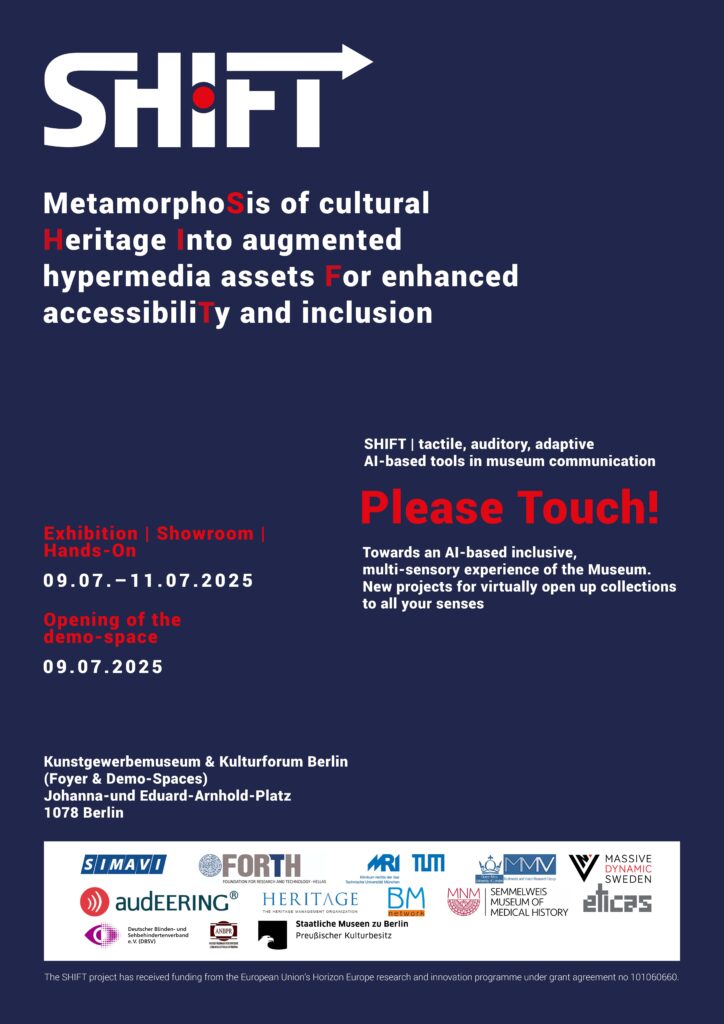The SHIFT project is excited to announce its upcoming 3rd pilot event, “Please Touch! Towards an AI-based inclusive, multisensory experience of the Museum,” which will take place from July 9 -11, 2025, in Berlin. This innovative pilot, led by SMB (State Museums of Berlin) and FORTH (Foundation for Research and Technology – Hellas), brings together cutting-edge technologies like artificial intelligence (AI), virtual reality (VR), and haptics to transform the way we interact with cultural heritage, making it more accessible to all visitors, including those with visual impairments.

Transforming Cultural Heritage through Technology
The 3rd SHIFT Pilot will showcase how AI-driven tools and virtual reality can revolutionize the museum experience by offering a multisensory and tactile journey. Over the course of the event, 20 sculptures and reliefs, including the Pergamon Altar from the 2nd century BC, will be brought to life through VR and haptic technology. These objects will be made accessible to people with visual impairments through the data-glove, allowing them to interact with the sculptures in a tactile way—sensing the texture, dimensions, temperature, and even movement patterns of the artwork. This pilot project focuses primarily on improving the experience for visually impaired and blind visitors, while also enriching the museum experience for all audiences, including those engaging through VR or gaming scenarios.
A Truly Inclusive Museum Experience
The multisensory experience offered by the pilot includes not just tactile interaction, but also visual, auditory, and dialogic engagement, thanks to the integration of Shift’s AI tools. This technology will transform the content of the museum’s collection to cater to diverse visitor needs, helping curators develop personalized narratives that engage each audience more effectively. Whether it’s through audio descriptions, motion sequences, or haptic feedback, SHIFT’s tools aim to create a holistic experience that is inclusive, engaging, and accessible to everyone.
For curators, the pilot will also demonstrate how SHIFT’s AI tools support the creation and delivery of content, allowing for more personalized and engaging storytelling. These tools transform the cultural heritage content to meet the expectations of different visitor groups, further advancing the museum’s goal of inclusivity.
Beyond Virtual Reality: Other SHIFT Tools in Action
Alongside the VR and Haptic Tool, the SHIFT Pilot will showcase other exciting tools:
- SMB Use Case 4.1: Digitized paintings for people with visual impairments will be transformed into soundscapes. This feature offers a sonic atmosphere that enriches the emotional journey for visitors by creating immersive audio landscapes based on the paintings.
- SMB Use Case 4.2: Image-to-text-to-speech technology will enhance the accessibility of 20 paintings from the Gallery of Old Masters, making them more comprehensible to visitors and curators by automatically generating complementary information from online sources.
Presentations and Workshops: Engaging the SHIFT Community
The pilot will also feature a series of presentations and workshops that delve into the intersection of AI, digital storytelling, and cultural heritage accessibility. Some key sessions include:
- Visual Storytelling: From Image to Video (July 9, 10:00-12:00)
- Stories Continued: Visual Extensions of Still Images (July 9, 14:00-15:30)
- SHIFT Platform: Practical Use of AI-Based Tools in the Collections (July 10, 10:00-12:00)
- Please Touch! The Inclusive Museum (July 11, 10:00-12:00)
- Landscape to Soundscape: First Results and Future Perspectives (July 11, 14:00-15:30)
These sessions will provide invaluable insights into the latest developments in inclusive design for museums, showcasing the potential of AI, VR, and haptic technologies to create more engaging, inclusive, and accessible experiences for all visitors.
A Look to the Future
The 3rd SHIFT Pilot in Berlin represents a key milestone in the project’s journey to transform cultural heritage through innovative technologies. It highlights the importance of inclusive design and the need to make cultural heritage accessible to all, no matter their abilities. With cutting-edge AI-driven tools, haptic feedback, and virtual reality, SHIFT is leading the way in making museums and galleries more accessible and engaging than ever before.
As we move closer to the event, SHIFT will continue to democratize access to cultural heritage, making it an experience that can be touched, felt, and understood by all. The project is paving the way for future technologies that can create more inclusive, accessible, and engaging cultural experiences, and this pilot event in Berlin is just the beginning.
Stay tuned for updates from Berlin and don’t miss out on this opportunity to witness the future of cultural heritage accessibility firsthand. Be sure to follow us on social media for more insights, behind-the-scenes looks, and exclusive content as we approach the event!
